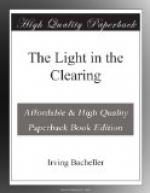BOOK ONE
Which is the Story of the Candle and the Compass
CHAPTER I
THE MELON HARVEST
Once upon a time I owned a watermelon. I say once because I never did it again. When I got through owning that melon I never wanted another. The time was 1831; I was a boy of seven and the melon was the first of all my harvests. Every night and morning I watered and felt and surveyed my watermelon. My pride grew with the melon and, by and by, my uncle tried to express the extent and nature of my riches by calling me a mellionaire.
I didn’t know much about myself those days except the fact that my name was Bart Baynes and, further, that I was an orphan who owned a watermelon and a little spotted hen and lived on Rattle road in a neighborhood called Lickitysplit. I lived with my Aunt Deel and my Uncle Peabody Baynes on a farm. They were brother and sister—he about thirty-eight and she a little beyond the far-distant goal of forty.
My father and mother died in a scourge of diphtheria that swept the neighborhood when I was a boy of five. For a time my Aunt Deel seemed to blame me for my loss.
“No wonder they’re dead,” she used to say, when out of patience with me and—well I suppose that I must have had an unusual talent for all the noisy arts of childhood when I broke the silence of that little home.
The word “dead” set the first mile-stone in the long stretch of my memory. That was because I tried so hard to comprehend it and further because it kept repeating its challenge to my imagination. I often wondered just what had become of my father and mother and I remember that the day after I went to my aunt’s home a great idea came to me. It came out of the old dinner-horn hanging in the shed. I knew the power of its summons and I slyly captured the horn and marched around the house blowing it and hoping that it would bring my father up from the fields. I blew and blew and listened for that familiar halloo of his. When I paused for a drink of water at the well my aunt came and seized the horn and said it was no wonder they were dead. She knew nothing of the sublime bit of necromancy she had interrupted—poor soul!
I knew that she had spoken of my parents for I supposed that they were the only people in the world who were dead, but I did not know what it meant to be dead. I often called to them, as I had been wont to do, especially in the night, and shed many tears because they came no more to answer me. Aunt Deel did not often refer directly to my talents, but I saw, many times, that no-wonder-they-died look in her face.
Children are great rememberers. They are the recording angels—the keepers of the book of life. Man forgets—how easily!—and easiest of all, the solemn truth that children do not forget.
A few days after I arrived in the home of my aunt and uncle I slyly entered the parlor and climbed the what-not to examine some white flowers on its top shelf and tipped the whole thing over, scattering its burden of albums, wax flowers and sea shells on the floor. My aunt came running on her tiptoes and exclaimed: “Mercy! Come right out o’ here this minute—you pest!”




